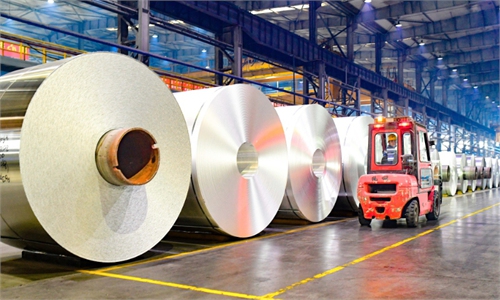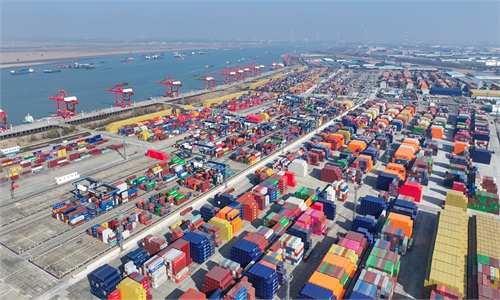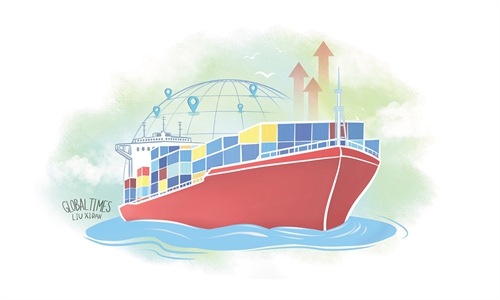Ban Ki-moon, Boao Forum for Asia Chairman of the Board, addresses a plenary session at the BFA on March 27, 2025. Photo: IC
Chinese Vice Premier Ding Xuexiang, also a member of the Standing Committee of the Political Bureau of the Communist Party of China Central Committee, attended the opening ceremony, calling for strengthening mutual trust, enhancing win-win cooperation, promoting economic globalization and safeguarding the free trade system.
Ding's remarks resonated with officials, business executives as well as scholars participating in the forum. They called for collaboration, highlighting China's role as a stabilizer and promoter of the global multilateral framework and free trade at a time when the world is facing increasing global challenges such as climate change and a complex international situation.
However, as voices for cooperation spoke loudly during the ongoing BFA, the US on Wednesday announced plans to impose 25-percent auto tariffs, with the measures set to take effect on April 2. Participants at the forum slammed the US' irresponsible move, saying that unilateralism has no future.
China presents opportunity
On the Chinese economy, Ding said economic performance in the country has been running steadily with a stronger outlook. The country will do its best to fulfill this year's goals and tasks for economic and social development, he said. "China is confident of realizing these goals and will contribute to development in Asia and the world."
Noting that China has set an economic growth target of around 5 percent for 2025, Michele Geraci, former Undersecretary of State at the Italian Ministry of Economic Development, told the Global Times that "I think 5 percent is a very, very good number...we do know that China is now evolving into a high-tech, innovative model, and this is also reassuring."
"This year, technology and innovation will become the main driver for China's economy," Geraci said, taking DeepSeek as an example, "It's open source, it's cheap, it's fast. DeepSeek is more efficient in the use of resources... and when we have a tech revolution that makes the hardware cheaper, that means that the whole world now can start developing applications on top of this hardware that is not as expensive as we thought it would be."
Wang Huiyao, founder and president of the Center for China and Globalization, a leading Chinese nongovernmental think tank, said that China is once again sending a signal to the world of its continuous opening-up, and the country will put the goals set during the annual two sessions into practice this year. "This has given the world a 'reassuring pill,' and China serves as the ballast stone of global development," Wang told the Global Times.
Jenny Shipley, former Prime Minister of New Zealand, told the Global Times on Thursday during the forum that "One of the greatest strengths of the Boao forum is that it brings government leaders and visitors from around the world, and they cherish the moment to be able to hear the update."
"The speech this morning gave real clarity on areas that China is focusing on. And I know that many people will take that back to their own businesses and to their home economies and think about how we can as partners leverage together. So it was an excellent speech, refreshing in this moment where people are very distracted. And I think we'll create some positive momentum after this conference," she noted.
Unilateralism vs multilateralism
While the BFA was advocating multilateral cooperation and free trade, the US announced on Wednesday its decision to impose 25 percent tariffs on imports of automobiles and certain automobile parts under the name of a so-called national security threat, a move that CNN described as "a significant escalation in a global trade war."
The new levies on cars and light trucks will take effect on April 3, the day after US plans to announce reciprocal tariffs aimed at the countries responsible for the bulk of the US trade deficit, Reuters reported. They come on top of duties already introduced on steel and aluminum, and on goods from China.
Speaking at a session of the BFA themed "US Foreign Policy and Its Implications on Asia-Pacific Cooperation" on Thursday, panelists from home and abroad outlined their respective concerns over the US government's tariff policy, saying that the move will not serve its purpose but backfire on the US.
"Do not try hard to understand the new US administration's trade policy. It is based on many falsehoods and many basic misunderstandings. It is primitive," US economist Jeffrey Sachs said at Thursday's session.
"If you do the basic arithmetic, the tariffs don't come anywhere close to offsetting the tax cuts for the richest people in America... they (tariffs) hit the poor Americans," Sachs said.
The American economist also noted that the tariffs will not protect the corresponding US industry but will have the opposite effect. "When the auto duties were announced, what happened to the auto share prices? They went down 5 percent... this will harm the US auto industry, making it permanently uncompetitive," Sachs said.
Responding to the tariff policy of the new US administration, Cui Tiankai, a former Chinese Ambassador to the US, said at the session that "more tariffs is an indication of less competitiveness... afraid of competition. It's a lack of confidence."
The latest tariff moves, particularly the increased tariffs on the automotive sector, are part of a broader pattern of escalating measures by the new US administration, Wang Huiyao said.
Wang believes the 25 percent tariff hike on automobiles will have little impact on China, "as we do not export many cars to the US." In contrast, this move will have a significant effect on other countries, such as those in Europe and Japan, Wang said.
In stark contrast with the US move, China has a clear perspective on tariffs, which is exemplified by offering zero-tariff treatment on 100 percent of tariff lines to the 43 least developed countries with which it has diplomatic relations in a bid to support their development and foster mutual benefits.
While the US raises tariffs, we are lowering them, creating a dynamic contrast, Wang said.
Zheng Yongnian, dean of the School of Public Policy at the Chinese University of Hong Kong, Shenzhen, said during the BFA that we should not underestimate the ability of China's opening-up policy to reshape the global trading system. China has now entered a high level of openness, and its unilateral opening-up is the best international public platform.
"History has proven time and again that only with opening-up and cooperation can a better prospect be embraced. China will continue to join hands with all parties to create an open, fair, just and non-discriminatory environment for sci-tech development, bringing benefits to more countries and peoples," Guo Jiakun, spokesperson from China's Foreign Ministry, said on Thursday.
RELATED ARTICLES





No comments:
Post a Comment